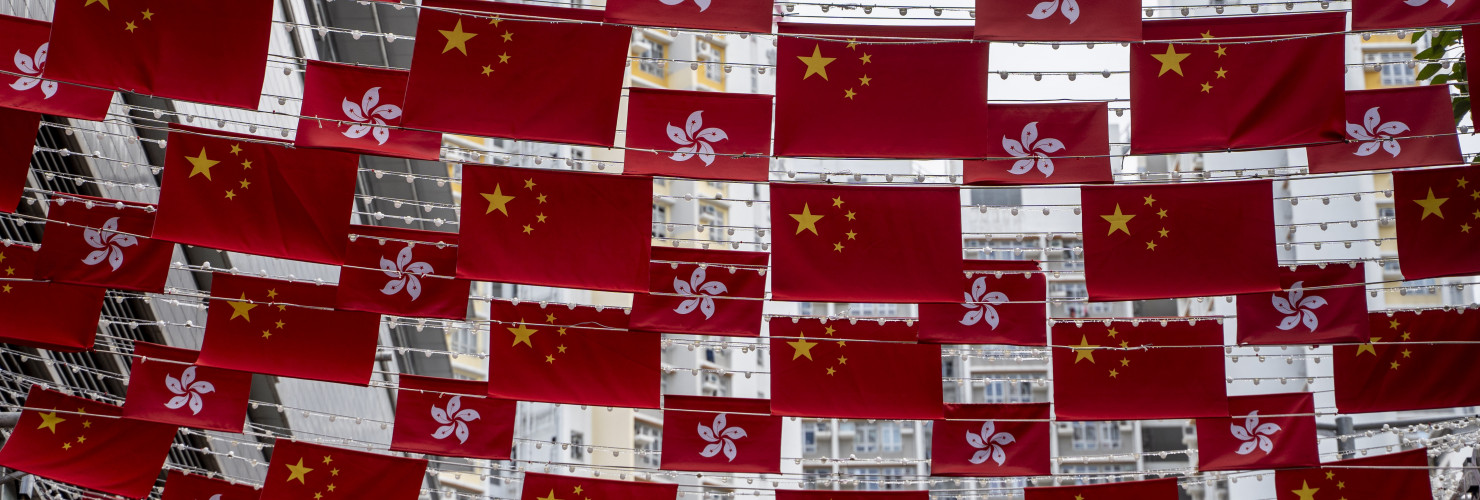

Three years of National Security Law in Hong Kong: Farewell “special status”?
Beijing’s draconian national security regime came into force in Hong Kong on July 1, 2020. Sophie Reiß says it threatens to undermine the city’s position in China and in the world.
Three years after the implementation of China’s Hong Kong national security law the rule of law in the region is decreasing, the free flow of information is threatened, and a significant number of well-educated young people have emigrated. Beijing’s avowed principle that China and Hong Kong are “one country” but “two systems” is blurring, raising questions about Hong Kong’s status as a “special administrative region” with legal, administrative, and judicial systems separate from the mainland.
The Hong Kong national security law (NSL) – officially the Law of the People's Republic of China on Safeguarding National Security in the Hong Kong Special Administrative Region – has allowed the government of Hong Kong to censor various kinds of content. For example, it recently asked global streaming platforms to not offer “Glory to Hong Kong”, a song widely regarded as a protest anthem, and which the region’s government considers seditious. Although the song is available online again after brief hiatus, the case shows the pressure the Hong Kong government is exerting on companies like Spotify and Google, which remain keen to stay in business in the city.
Secondly, the NSL has severely reduced the rule of law in Hong Kong by granting the government powers to circumvent the courts and thereby deny defendants a fair trial. The case of media entrepreneur Jimmy Lai illustrates how this presents a risk to businesses and their property rights. The Hong Kong government froze Lai’s majority of shares in his company Next Media, which led to its liquidation and the end of the pro-democracy newspaper Apple Daily. The case is highly political and does not reflect the situation of most businesses, but it does show the power the Hong Kong government can wield over business.
Lastly, over 100,000 Hong Kongers have emigrated since mid-2020. Surveys show a clear shift in motivation: While high costs of living and the notoriously difficult housing situation continue to play a role in their decision, political factors were named by more than half of respondents in 2022 – including worries about the erosion of freedom, human rights, free information, “one country two systems”, as well as dissatisfaction with the HK government and “fear of or dissatisfaction with the NSL”.
This wave of emigration has swept up mainly younger, well-educated and well-paid Hong Kongers alongside the politically active. Apart from changing the demographics of the city, this brain drain has left many services understaffed: Hong Kong’s Hospital Authority has hosted recruitment events for overseas medical staff, and the local government and Hong Hong police force have lowered their employment requirements. To entertain the populace, Hong Kong has launched several campaigns and held a “patriotic festival” at the start of June, effectively replacing the now-prohibited vigil to mark the crackdown around Tiananmen Square in 1989.
These developments will likely intensify if the Hong Kong government introduces its own – very probably stricter – national security act under Article 23 of the city’s Basic Law. It calls on the city to prohibit seven activities – treason, secession, sedition, subversion of the government, theft of state secrets, allowing foreign bodies to conduct political activities and local bodies to establish ties with these. By contrast, China’s NSL “only” focuses on the four particular crimes of secession, subversion, terrorism and collusion with foreign organizations.
Indeed, the Hong Kong government has said that its local security law was needed to plug “gaps” in Beijing’s legislation. Signs of the continuing erosion of Hong Kong’s special status in China threatens to start a debate about the special status Hong Kong enjoys internationally – Hong Kong passport holders enjoy visa-free travel into Europe‘s Schengen Area, for example. The European Parliament recently passed a non-binding resolution calling on Hong Kong to respect its citizens’ freedoms. Developments like this show concerns about developments are growing in the West. Hong Kong’s special status is doubly threatened.

